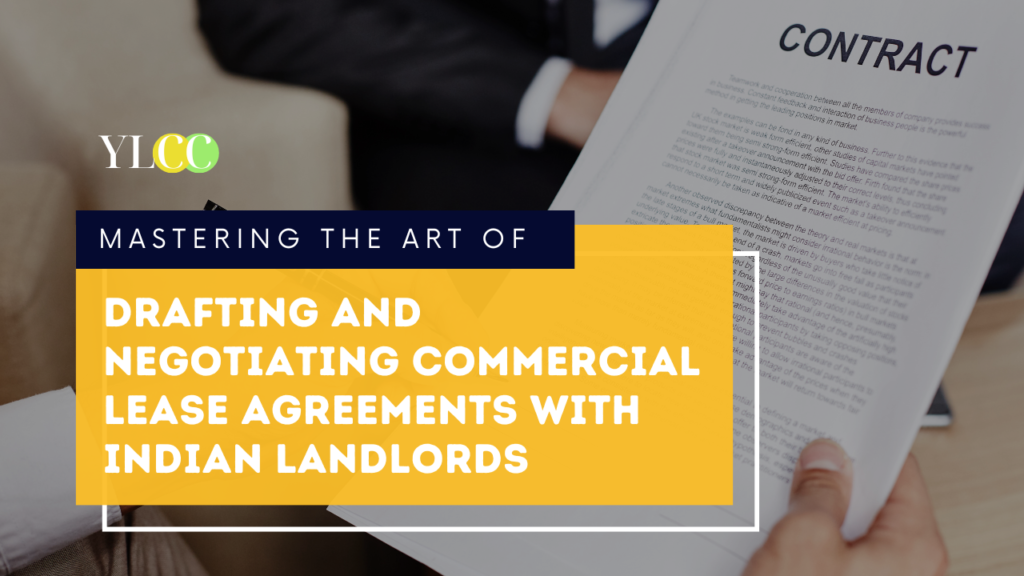
Expertly navigating the complexities of commercial leasing in India
Are you ready to become a master of commercial leasing in India? Drafting and negotiating lease agreements with Indian landlords can be a tricky business, but fear not, we’re here to help you hone your skills! Get your negotiation pants on and buckle up, as we take you on a journey to explore the art of commercial leasing in India. From gross leases to net leases and everything in between, we’ll guide you through the different types of lease agreements and help you become a leasing guru. So, grab a cup of chai, sit back, and get ready to master the art of drafting and negotiating commercial lease agreements with Indian landlords. Let’s go!
Get to Know the Different Types of Commercial Lease Agreements in India
Leasing a property can be exciting, but it’s important to know the different types of leases available to make sure you choose the one that best suits your needs.
Gross Lease? Net Lease? Percentage Lease? Modified Gross Lease? Ground Lease? Short-term Lease? Long-term Lease? Renewal Option? Phew, that’s a lot to remember! But don’t worry, we’ve got you covered.
If you’re looking for a lease where the landlord covers all expenses associated with the property, including taxes, insurance, maintenance, and repairs, then a gross lease might be the perfect fit for you.
On the other hand, if you don’t mind sharing some of the expenses associated with the property and want to pay a fixed rent amount each month, then a net lease might be the one for you. And if you’re running a retail business, then a percentage lease could be your cup of tea, where you pay a base rent amount plus a percentage of your gross sales.
But what if you want a combination of both gross and net leases? Don’t worry, we’ve got you covered with a modified gross lease.
Looking for a long-term location for your business? Then a long-term lease might be the one for you. Or, if you just need temporary space, then a short-term lease could be perfect for your pop-up shop or seasonal business.
And if you’re not sure if you want to commit to a long-term lease, then a renewal option might be the right choice for you. It allows you to extend your lease for an additional period of time if your business is successful and you want to continue operating in the same location.
So, whether you’re a seasoned business owner or a new entrepreneur, make sure you choose the right commercial lease agreement for your needs.
Key Terms To Include In Commercial Lease Agreements
- Rent: The lease agreement must specify the rent amount to be paid by the tenant to the landlord. The rent amount can be fixed or subject to revision based on certain conditions, such as inflation or changes in the market conditions.
- Security Deposit: The lease agreement must also specify the security deposit amount that the tenant needs to pay to the landlord before occupying the property. The security deposit is usually a certain percentage of the total rent amount and is refundable at the end of the lease period.
- Lease Period: The lease period must be clearly defined in the agreement, including the start and end dates. The lease period can be extended or renewed based on mutual agreement between the landlord and tenant.
- Maintenance and Repair: The agreement must clearly specify the responsibilities of the landlord and tenant in terms of maintenance and repair of the property. It must also define the timelines and procedures for reporting any damages or repairs required.
- Termination Clause: The agreement must include a termination clause, which outlines the conditions under which the landlord or tenant can terminate the lease agreement before the end of the lease period.
Lease Negotiation 101: Tips for Drafting and Negotiating a Commercial Lease Agreement in India
Do Your Research: The Battle is Half Won
Before you start drafting a commercial lease agreement, make sure you do your research. Know the market and the landlord’s preferences before presenting your proposal. Research the location of the property, the rental rates of similar properties in the area, and the amenities offered by the landlord. This will give you a better understanding of what to expect from the landlord and help you create a lease proposal that is in line with your budget and requirements.
Keep Your Cool: Negotiation is an Art
Negotiation is an art, and it requires patience, persistence, and a cool head. Avoid getting emotional or confrontational during the negotiation process. Instead, focus on presenting your case logically and clearly. Be prepared to compromise where necessary, but do not give up your core interests. A good negotiation should end with both parties feeling satisfied.
Keep Communication Open: A Healthy Relationship Goes a Long Way
After the lease agreement has been signed, it’s important to maintain open lines of communication with the landlord. This can help prevent misunderstandings and ensure that the lease agreement is being upheld by both parties. Regular communication can also help build a healthy relationship between you and the landlord, which can be beneficial for future lease negotiations.
Get it in Writing: Clarity is Key
Once you have reached an agreement with the landlord, it’s time to draft the lease agreement. Make sure all the terms and conditions of the lease are clearly spelled out in the agreement. This includes the rental amount, lease term, security deposit, maintenance responsibilities, and any other relevant clauses. Ensure that both parties sign the agreement before moving forward.
Tips for a Successful Commercial Lease Agreement Negotiation in India
Hey there, ready to negotiate like a pro? Negotiating a commercial lease agreement with a landlord in India can be a bit of a puzzle, but fear not! Here are some tips to help you score a favorable agreement:
Get into the landlord’s head: Before entering into negotiations, try to understand the landlord’s perspective and priorities. It’s like playing a game of chess; anticipate their moves and tailor your proposals accordingly.
Jot down a checklist of must-haves: Don’t want to miss any crucial details? Prepare a list of key terms that you want to negotiate, such as rent, security deposit, lease period, and maintenance responsibilities. This will help you stay focused during negotiations and keep you from getting sidetracked.
Be open to give-and-take: Negotiating is like a game of Twister; it requires flexibility and willingness to compromise. Identify the areas where you can bend and the areas where you need to stand firm. Strike a balance that benefits both parties.
Lawyer up, folks! It is advisable to seek legal advice before finalizing the lease agreement. A legal expert can help you navigate the legal implications of the agreement and make sure you’re not getting the short end of the stick. So, get your legal eagle on board and protect your interests like a boss!
Let’s Get Down To Business: Drafting A Comprehensive Commercial Lease Agreement In India
Congratulations, you’ve negotiated the key terms of your commercial lease agreement with the landlord. Now it’s time to draft the actual agreement. Don’t let the legal jargon intimidate you, here are some tips to make sure your lease agreement is comprehensive, clear, and concise.
Keep it Simple – Make It Easy Peasy Lemon Squeezy!
Avoid using legal jargon in your lease agreement. Use simple and concise language to avoid any misunderstandings or disputes.
Cover All The Bases – Protect Yourself
Make sure that all the key terms, such as rent, security deposit, lease period, and maintenance responsibilities, are included in the agreement. Don’t leave anything out!
Define it – What It Means
Define all terms used in the agreement to avoid confusion. If the agreement mentions ‘common areas,’ make sure to define what is included in the common areas.
The Security Deposit – It’s No Joke
The security deposit is a critical aspect of your commercial lease agreement. Make sure you specify the amount, mode of payment, and the conditions under which the landlord can withhold a portion or the entire amount of the security deposit.
Renewal and Termination – The Fine Print
Don’t forget to include provisions for the renewal and termination of the lease agreement. The duration of the lease agreement should be specified, along with the notice period required for termination or renewal.
Assignment and Subletting – Proceed With Caution
The lease agreement should address the assignment and subletting of the property. The landlord may prohibit the tenant from subletting or assigning the property without their prior consent
Dispute Resolution – Let’s Hope It Doesn’t Come To This
The lease agreement should have provisions for dispute resolution, such as mediation or arbitration, and the forum for resolution, such as the courts in a particular jurisdiction. Let’s hope you never have to use this clause!
Conclusion
Drafting and negotiating a commercial lease agreement with a landlord in India can be a complex and time-consuming process. It is essential to work with an experienced attorney who has a thorough understanding of Indian real estate laws and regulations. A well-drafted lease agreement can protect the interests of both the landlord and tenant and prevent disputes from arising in the future. By considering the factors discussed above, landlords and tenants can negotiate a lease agreement that meets their needs and ensures a successful business relationship.
This article has been written by Team YLCC. For any other queries, reach out to us at: queries.ylcc@gmail.com






